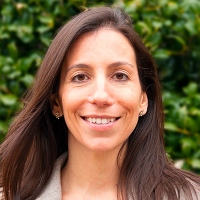Learn what gives Senior Humanitarian Response Specialist Sandrina da Cruz hope in the midst of the COVID-19 pandemic.

A: I’m in awe of the hundreds of GlobalGiving partners that have doubled down on their support to communities around the world while their teams and families are themselves affected by this pandemic. In Italy, Fondazione Francesca Rava Nph Italia Onlus is coordinating closely with hospitals and government agencies to provide critical medical support. They are sending volunteer doctors and nurses to local hospitals, supplying medical equipment for emergency intensive care wards, and delivering masks and other protective equipment to shelters and foster care centers.
Sheltering in place puts people vulnerable to sexual and other domestic violence and abuse at even greater risk, particularly children and women. Childline Kenya manages the National Child Helpline which operates 24/7—coordinating with government agencies to respond urgently to increasing requests for help. Because of inadequate access to WiFi, their staff must travel to the call center to provide this crucial service.
People with disabilities are being overlooked during the COVID-19 response—both in terms of access to safety information and services. The Arc of South Norfolk in Massachusetts reallocated 56 direct care workers into residential homes for people with disabilities. Their team is delivering groceries and cleaning products to hundreds of families living with children and adults with disabilities.
A: Social distancing measures are essential to bring the pandemic under control, but nonprofits are finding it difficult to continue providing services to the most vulnerable among us. I’m hearing from our partners that even if they could deliver their programs and services to clients remotely, they don’t have the technology to make this possible. They don’t have laptops for their staff to work from home, or reliable WiFi access. In some cases, nonprofit teams need training on the use of new online platforms or money to pay for the necessary tools and software. In addition, it’s frequently the case that with libraries and other community centers closed, their clients do not have computer or online access.
A: Following China, we have watched the virus hit Europe and North America. I worry about what people are calling the third wave as this virus sweeps through lower income countries in Africa, Asia and South America. In many of these countries, the healthcare system is weak, malnutrition rates are high, climate change is already impacting livelihoods. In some cases, COVID-19 is layered on top of an existing humanitarian crisis—as is the case of the D.R.C. and South Sudan. I’m also concerned about refugees, particularly those living in crowded camps with minimal access to health care and clean water.
A: Cash is the best way to respond to the multitude of needs created by the spread of COVID-19 and the lockdown measures governments have instituted to keep us safe. Many local nonprofits are in the same boat as other small businesses—they’re struggling to pay their staff, preserve revenue sources, and stay afloat.
Local nonprofits are deeply rooted in their communities and core to helping their communities get through this pandemic. We trust them to understand and prioritize needs: provide protective medical equipment to keep medical responders safe; deliver bread and basic food staples to clients who can no longer travel to their food pantries; or purchase a laptop that will enable their staff to provide remote mental and emotional support. In challenge lies opportunity, and this pandemic is no exception. Nonprofit leaders have always known this and their guidance and services are essential to guide us through this crisis.
A: I’m incredibly fortunate to be part of a dedicated team at GlobalGiving collaborating with a community of extraordinary nonprofits and generous donors. Responding to this global pandemic while working remotely and caring for my family can become overwhelming at times. I’ve found that breathing meditation is a great way to pause and recenter myself. I’m also doing lots of video chats with loved ones, playing board games with my family, and cuddling with my kitty. Balance looks different for everyone, and I hope that we can all make a little space for equilibrium during this period of deep uncertainty.
A: Nonprofits are made up of passionate, mission-oriented teams, often staffed primarily by volunteers. As we’ve learned and witnessed during pivotal moments in history, the human spirit is capable of extraordinary feats and nonprofits demonstrate this best.
I’ve spoken to many of our nonprofit leaders who are undeterred and innovating ways to adapt their services. Save the Deaf and Endangered Language Initiative is conducting COVID-19 awareness campaigns in sign language for deaf communities in rural Nigeria. IsraAID is adapting its psychosocial support services to help address the impacts of social isolation and providing remote sessions to first responders and other community members.
These community champions give me hope that together we will defeat this virus.
Featured Photo: Reduce the spread of Covid19 in Kibra slum. by GARDEN OF HOPE FOUNDATIONFind exactly what you're looking for in our Learn Library by searching for specific words or phrases related to the content you need.